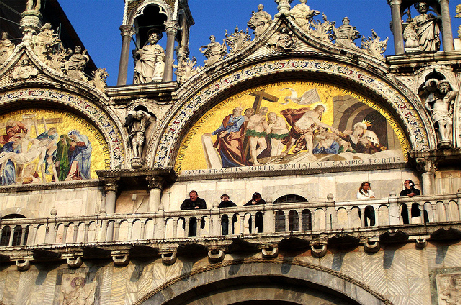
Gates alumnus Braxton Boren presents research at American Acoustical Society.
What would the works of great Renaissance composers like Monteverdi, Willaert and Gabrieli have sounded like when they were heard for the first time?
Research by Gates alumnus Braxton Boren and Professor Malcolm Longair, a physicist at the University of Cambridge, shows that the acoustics were best on festivals when the churches were packed and decorated with tapestries and favoured the person sitting in the richest seat.
They revealed the results of their research on two Venetian churches at the American Acoustical Society on Monday.
The research has been covered by Science magazine, Discover magazine and the Scientific American.
Boren and Longair recreated online the acoustics of the Redentore and Basilica of San Marco during the Renaissance period, a time when new music was being written which required a very detailed understanding of polyphony – music which uses split choirs and multiple parts.
The two collaborated with Deborah Howard, Professor of Architectural History, to assess how the buildings have changed over the past 400 years and hope eventually to be able to listen to the way they sounded when they were built. It was Professor Howard’s long history of researching Venice that first prompted the interest in the acoustics of Venetian churches.
She advised on how churches like the Redentore would have sounded during special festivities, with extra seats put in for VIPs and tapestries hung. The latter, for example, would have cut the normal reverberation in the church.
They first characterised acoustically how music would have sounded in different parts of the church to gauge all the acoustic parameters. Then Boren built a virtual model of the church. The researchers then added in all the acoustic variables, such as the material used for the walls, tapestries and the number of people who might have been in the audience.
To test how the music would have sounded in various virtual spaces, they recorded St John’s choir in a place with no echoes so that they can add in different spatial effects to see what difference these would have made to the sound. On the computer they can move the choir around the virtually created churches to find out how a piece of music might have sounded in the past depending on where singers were placed.
They also investigated the impact of the small pergoli, or balconies, on a person sitting in the Doge’s throne when a choir was split between them and found that in a fully decorated church the reverberation time was reduced to between 1.5 and two seconds.
Braxton [2009] did an MPhil in Physics at the Cavendish Laboratory, building acoustical models of Renaissance Venetian Churches. He is now studying Spatial Sound at the Music and Audio Research Lab at New York University.
Picture credit: NoeliaCG and Creative Commons












